高中必修一直接引语变间接引语详解
高中英语直接引语变间接引语(35张PPT)

➢句子结构的变化
1. 直接引语是陈述句,变为间接引语的方法 引导词为: that 语序: 不变
• He said, “I have been to the Great Wall. ” • He said that he had been to the Great Wall. • He said, “I'll give you an exam next Monday. ”
Direct Speech & Indirect speech
直接引语: 妈妈说:” 杰克是个好工人“. Direct speech:
Mother said :”Jack is a good worker.” 间接引语:妈妈说杰克是个好工人。 Indirect speech: Mother said that Jack is a good worker
小结:
➢ 在直接引语变为间接引语时需要注意的变化 1.注意时态的变化; 2.注意人称变化; 3.注意指示代词的变化; 4.注意时间状语的变化; 5.注意地点状语的变化; 6.注意个别趋向动词的变化。
将下列句子转换为间接引语:
1. He said,“ I have finished my homework last night”. He said that he had finished his homework the night before.
⑤直接引语如果是以“Let's”开头的祈使句,变为间 接引语时,通常用“suggest +动名词(或从句)” 如: He said, "Let's go to the movies."
→He suggested going to the movies. 或He suggested that they go to see the movies.
直接引语变间接引语(宾语从句)讲解与练习(附答案)

直接引语变间接引语(宾语从句)讲解与练习一.讲解:在复合句中,作宾语的句子(主谓结构)就叫宾语从句。
直接引语变间接引语多数情况下构成宾语从句。
变化时应注意以下几点:1.引导词(连词)①如果直接引语是陈述句,变成间接引语,引导词用that, that没有实际意义,口语或非正式文体中常省略He said, “My mother is a doctor.”→He said (that) his mother was a doctor.②如果直接引语是一般疑问句,变成间接引语,引导词就用if。
不能省略“Are you English”He asked me→He asked me if I was English.③如果直接引语是特殊疑问句,变成间接引语,引导词就用特殊疑问句的疑问词,如:whatwhen where which who how等,这些词有意义,不能省略:eg “How old are you ” He asked me→He asked me how old I was.二.间接引语的宾语从句中,引导词之后都必须使用陈述语序,即“引导词+主语+谓语…),肯定式的宾语从句不用助动词do(did或does) .She asked, “What does he want”→She asked what he wanted.He asked me ,“Do you like English”→He asked me if I liked English.三.时态的变化:1.如果主句中的谓语动词用一般过去时,则间接引语中宾语从句须用过去的某种时态。
基本原则是:往过去的方向推一个时态,即一般现在时变成一般过去时,现在进行时变成过去进行时,一般将来时变成过去将来时eg:①He asked me, “Do you have a dictionary”→He asked me if I had a dictionary.②She asked, “What is Tom doing →She asked what Tom was doing.③She said ,“I will leave a message on his desk.”→She said that she would leave a message onhis desk.2.如果宾语从句表达的是客观真理,自然现象。
高一英语必修一Unit1Grammar语法直接引语间接引语
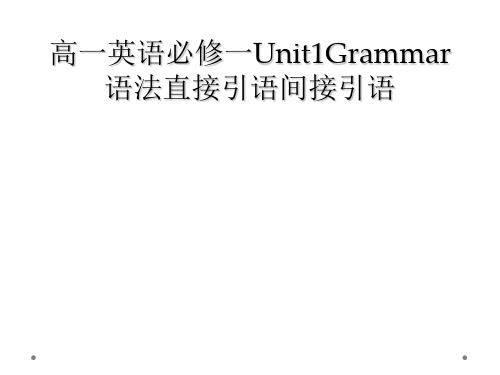
仍用一般现在时。例如: Teacher said to us:" The moon moves round
the earth." Teacher told us the moon moves round the earth. The teacher said to us : “Light travels faster
宾语从句
判断以下哪些句子属于间接引语
She said that she didn’t want to be a teacher. 间接 She said, “I don’t want to be a teacher〞.直接 He said, “ I like playing football〞. 直接 He said that he liked playing football. 间接
3. Mr Black said, “I have walked a long way this week.〞 Mr Black said that __ a long way __. A. I had walked…last week B. he had walked…that week C. I walked…last week D. he has walked…this week
〞 • 间接引语 Mum told me that I could clean my bedroom the next day . • Mr. Smith said,“He is a good worker. ’’ • Mr. Smith said that he was a good worker.
3.人称的变化
• 直接引语里的第一人称和第二人称,变间接引语时,人称要做相 应调整。例如:
直接引语变间接引语的方法
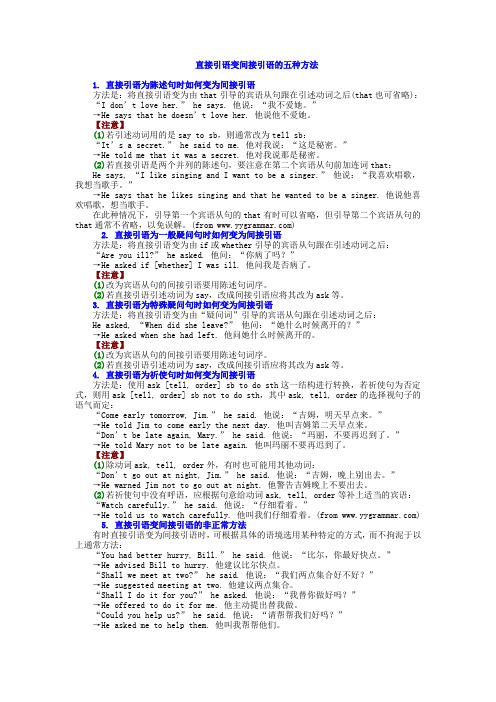
直接引语变间接引语的五种方法1. 直接引语为陈述句时如何变为间接引语方法是:将直接引语变为由that引导的宾语从句跟在引述动词之后(that也可省略):“I don’t love her.” he says. 他说:“我不爱她。
”→He says that he doesn’t love her. 他说他不爱她。
【注意】(1)若引述动词用的是say to sb,则通常改为tell sb:“It’s a secret.” he said to me. 他对我说:“这是秘密。
”→He tol d me that it was a secret. 他对我说那是秘密。
(2)若直接引语是两个并列的陈述句,要注意在第二个宾语从句前加连词that:He says, “I like singing and I want to be a singer.” 他说:“我喜欢唱歌,我想当歌手。
”→He says that he likes singing and that he wanted to be a singer. 他说他喜欢唱歌,想当歌手。
在此种情况下,引导第一个宾语从句的that有时可以省略,但引导第二个宾语从句的that通常不省略,以免误解。
(from )2. 直接引语为一般疑问句时如何变为间接引语方法是:将直接引语变为由if或whether引导的宾语从句跟在引述动词之后:“Are you ill?” he asked. 他问:“你病了吗?”→He asked if [whether] I was ill. 他问我是否病了。
【注意】(1)改为宾语从句的间接引语要用陈述句词序。
(2)若直接引语引述动词为say,改成间接引语应将其改为ask等。
3. 直接引语为特殊疑问句时如何变为间接引语方法是:将直接引语变为由“疑问词”引导的宾语从句跟在引述动词之后:He asked, “When did she leave?” 他问:“她什么时候离开的?”→He asked when she had left. 他问她什么时候离开的。
高中直接引语和间接引语转化详解(含习题及答案)

直接引语和间接引语转化详解引用别人的话有两种方式,一种是讲述别人的原话,并把它放在引号里,这叫直接引语;另一种是用自己的话来转述别人,并且不能用引号,这就是间接引语。
直接引语和间接引语之间可以互相转换。
扩展1、直接引语如果表示客观真理,变间接引语时,时态不变。
2、直接引语若有明确的表示时间的词语,变间接引语时,时态不变。
3、若直接引语中含有c o u l d,m u s t,s h o u l d等情态动词,变间接引语时,时态不变。
4、直接引述别人的原话,叫直接引语。
5、用自己的话转述别人的话,叫间接引语。
直接引语变间接引语的五点变化1.时态变化直接引语变为间接引语时,若主句为过去时态,变为宾语从句的时态如下表:"l l i k e E n g l i s h v e r y m u c h,"h e s a i d.他说:“我很喜欢英语。
”→H e s a i d t h a t h e l i k e d E n g l i s h v e r y m u c h.H e s a i d,"I t w i l l r a i n s o o n."他说:“很快就会下雨。
”→H e s a i d t h a t i t w o u l d r a i n s o o n.注意:[1]若直接引语为客观真理,则变为间接引语时时态不变:T h e t e a c h e r s a i d t o u s,"K n o w l e d g e i s p o w e r."老师对我们说:“知识就是力量”→T h e t e a c h e r t o l d u s t h a t k n o w l e d g e i s p o w e r.[2]有时由于直接引语有特定的过去时态状语,变为间接引语时时态也可不变:H e s a i d,”M y d a u g h t e r w a s b o r n i n1997."他说:“我的女儿是1997年出生的。
高中必修一直接引语变间接引语习题 详解
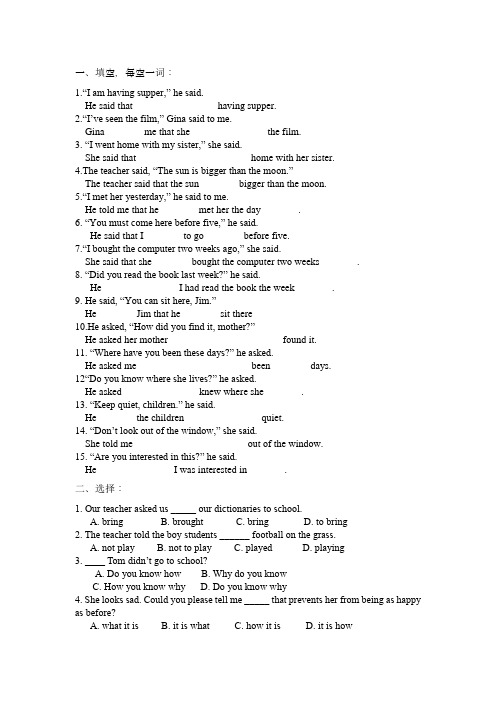
一、填空,每空一词:1.“I am having supper,” he said.He said that ______ _______ having supper.2.“I’ve seen the film,” Gina said to me.Gina _______ me that she _______ _______ the film.3. “I went home with my sister,” she said.She said that _______ _______ _______ home with her sister.4.The teacher said, “The sun is bigger than the moon.”The teacher said that the sun _______ bigger than the moon.5.“I met her yesterday,” he said to me.He told me that he _______ met her the day _______.6. “You must come here before five,” he said.He said that I _______ to go _______ before five.7.“I bought the computer two weeks ago,” she said.She said that she _______ bought the computer two weeks _______.8. “Did you read the book last week?” he said.He _______ _______ I had read the book the week _______.9. He said, “You can sit here, Jim.”He _______ Jim that he _______ sit there10.He asked, “How did you find it, mother?”He asked her mother _______ _______ _______ found it.11. “Where have you been these days?” he asked.He asked me _______ _______ _______ been _______ days.12“Do you know where she lives?” he asked.He asked _______ _______ knew where she _______.13. “Keep quiet, children.” he said.He _______ the children _______ _______ quiet.14. “Don’t look out of the window,” she said.She told me _______ _______ _______ out of the window.15. “Are you interested in this?” he said.He _______ _______ I was interested in _______.二、选择:1. Our teacher asked us _____ our dictionaries to school.A. bringB. broughtC. bringD. to bring2. The teacher told the boy students ______ football on the grass.A. not playB. not to playC. playedD. playing3. ____ Tom didn’t go to school?A. Do you know howB. Why do you knowC. How you know whyD. Do you know why4. She looks sad. Could you please tell me _____ that prevents her from being as happy as before?A. what it isB. it is whatC. how it isD. it is how5. Betty asked her sister ____ to the railway station to see her off.A. not to comeB. not to goC. to not comeD. to not go6. The pupil asked his teacher _____ round the earth.A. weather the moon goesB. that the moon wentC. whether the moon goesD. whether the moon went7. Mr. Li ____ Wang Ling ____ a taxi to the airport.A. asked; takeB. asked; takingC. told; takeD. told; to take8. She asked him ____.A. whose dictionary this isB. whose dictionary that wasC. whose dictionary is thisD. whose dictionary that is9. Mary’s mother asked her _____.A. that whether she had finished her homeworkB. if she has finished her homeworkC. if she had finished her homeworkD. that if she had finished her homework10. Do you know ____?A. what is he doingB. what he doingC. what he is doingD. what does he do now11. I don’t know ____ to learn English.A. when did he beginB. when he beganC. he when beganD. when he begins12. He asked me ____.A. how would the weather be like tomorrowB. what the weather would be like the next dayC. how the weather would be like tomorrowD. what would the weather be like the next day13. You can’t imagine ____ when they received these nice Spring Festival presents.A. how excited they wereB. how excited were theyC. how they were excitedD. they were how excited14. She told me that she ____ by her relatives at the bus stop.A. had been seen offB. have seen offC. have been seen offD. had seen off15. Do you remember how many times ____ to Australia?A. had you beenB. did you goC. have you beenD. you have been16.Can you guess ____?A. what is that manB. who that man isC. whom that man isD. who is that man17. More and more students and teachers have began to know ____.A. how important the foreign language areB. how the foreign language is importantC. how important the foreign language isD. how important is the foreign language18. The hostess said that it ___ time that they ___ supper.A. was; hadB. was; had hadC. is; haveD. is; have had19. The boss asked his secretary ____ he had finished typing the report ____.A. if; or notB. if; notC. whether; or notD. whether; not20. I wonder how much _____.A. does he spend on his carB. did he spend on his carC. he spent on his carD. he spent in his car答案一、填空1. he, was。
高中英语必修一Unit1语法精讲直接引语变间接引语精品PPT课件

met him in the street.
⑤.情态动词没有过去时的形式(ought to, had better, used to)或已经是过去时的形式时 (could, should, would, might):
six.
⑥.一般现在时(表示一种反复出现或习惯性的动作): • He said, “I get up at six every morning.” • →He said he gets up at six every morning.
⑦.一般现在时(表示所述事实在当时和目前同样生效) :
• He said, “I’m a boy, not a girl.” • →He said that he is a boy, not a girl.
for class. ②.一般过去时变过去完成时: • He said to me, “I met your father.” • →He told me that he had met my father.
③.一般将来时变过去将来时: • She said, “He will go to see his friend.” • →She said he would go to see his friend. ④.现在完成时变过去完成时: • She said. “I have lost a pen.” • →She said that she had lost a pen ⑤.现在进行时变过去进行时: • She said to me, “I’m studying Japanese these days.” • →She told me that she was studying Japanese those
高一英语直接引语与间接引语知识精讲PPT课件.ppt

时态、时间状语、地点状语、指示代词、动词、呼 语等方面的变化。 ❖ 1. 人称的变化,包括人称代词、物主代词、反身代 词等。
❖ He said , “ I’ve left my book in your room . ” ❖ 他说:“我把我的书落在了你的房间。”
❖ (1)They said , “ we are having an exam now . ” 他们说, “我们正在考试。”
❖ They said that they were having an exam then . 他们说 那时他们正在考试。
❖ (2)John told me , “ About 5,000 people went to the concert yesterday . ”
❖ ▲ 没有间接宾语的,可以加一个间接宾语。 如me,him等。
❖▲ 从句用陈述语序。 ❖eg .(1)He said , “ Do you
understand ? ” ❖他问,“你理解吗?”
❖ He asked me if / whether I understood .
❖他问我是否我理解了。
❖ (2)He asked me , “ Which part of China impresses you most ? ”
❖ (3)tonight→that night (4)this week→that week
❖ (5)yesterday→the day before (6)yesterday evening→the evening before
❖ (7)last week→the week before (8)three days ago→three days before
完整版直接引语变间接引语及宾语从句讲解

A 重庆戴氏高考•中考学校(白帝城校区)主讲人:李老师英语语法复习直接引语变间接引语语法讲解一、人称人称变化可以遵循如下顺口溜一随主,二随宾,第三人称不更新”。
一随主”是指在直接引语变间接引语时,如果从句中的主语是第一人称或被第一人称所修饰。
从句中的人称要按照主句中主语的人称变化,如:She said. My“ brother wan ts to go with me. ”f She saidher brother wan ted to go with her.二随宾”是指直接引语变间接引语时,若从句中的主语及宾语是第二人称,或被第二人你”所修饰,从句中的人称要跟引号外的主句的宾语一致。
如果引号外的主句没有宾语,也可以用第一人称,如:He said to Kate,"How is your sister now?"f He asked Kate howher sister was the n.第三人称不更新”是指直接引语变间接引语时,如果从句中的主语及宾语是第三人称或被第三人称所修饰从句中的人称一般不需要变化,如:Mr. Smith said,Jack is a good worker. ”f Mr. Smith said Jack was a good worker.、时态直接引语在改为间接引语时,时态需要做相应的调整。
其基本法则和我们刚刚学过的宾语从句的时态变化一致,也就是说从句时态要和主句时态一致。
如果从句是过去时,主句要向后退一格时态,变成一种过去时。
1.She said. haVe lost a pen. ” f She said s h ad lost a pen.(现在完成g过去完成)2.She said. hop e so. ” f She said thhyped so.(一般现在g —般过去)3.She said, wHle go to see his friend ”f She said hewould go to see his friend. 一般将来 f 过去将来)但要注意在以下几种情况下。
高中英语知识点归纳直接引语和间接引语的转换

高中英语知识点归纳直接引语和间接引语的转换高中英语知识点归纳:直接引语和间接引语的转换直接引语(Direct Speech)是指将他人的原话直接引述出来。
而间接引语(Indirect Speech)则是将他人的原话转述为自己的话。
在英语中,我们常常需要将直接引语转换为间接引语,或者将间接引语转换为直接引语。
了解如何正确转换直接引语和间接引语是学习英语语法的重要一环。
本文将系统地介绍直接引语和间接引语的转换规则。
一、直接引语转换为间接引语的规则:1. 动词变换- 当直接引语的句子是陈述句时,直接引语的动词要改为相应的引述动词,通常为say或tell。
- 当直接引语的句子是疑问句时,直接引语的动词要改为相应的引述动词,并且将疑问句转换为陈述句。
2. 人称代词和时间状语的变换- 当直接引语的人称代词是第一人称(I)时,要根据转述者的身份和角色进行变换。
- 当直接引语中有时间状语时,要根据转述的时间进行适当的变换。
3. 转述句的变换- 当直接引语是陈述句时,转述句中的时态、人称和人称代词要根据转述者的角色进行相应的变换。
- 当直接引语是疑问句时,转述句要改为陈述句,并根据情景加上适当的疑问词。
二、间接引语转换为直接引语的规则:1. 动词变换- 当间接引语是陈述句时,直接引语的动词要改为相应的陈述动词。
- 当间接引语是疑问句时,直接引语的动词要改为相应的疑问动词,并将陈述句转换为疑问句。
2. 人称代词和时间状语的变换- 当间接引语中有第一人称或第二人称的人称代词时,转述为直接引语时,要根据语境和说话的对象进行相应的变换。
- 当间接引语中有时间状语时,要根据语境中的时态进行适当的变换。
3. 直接引语的标点符号- 将间接引语转换为直接引语时,要根据语境中的语气和情感添加相应的标点符号。
三、注意事项:1. 语气和情感的保留- 在转换直接引语和间接引语时,要注意保持原始语句中的语气和情感。
2. 引号的使用- 直接引语使用双引号(" ")来标注,间接引语则不需使用引号。
高中英语知识点归纳直接引语和间接引语的变化规则
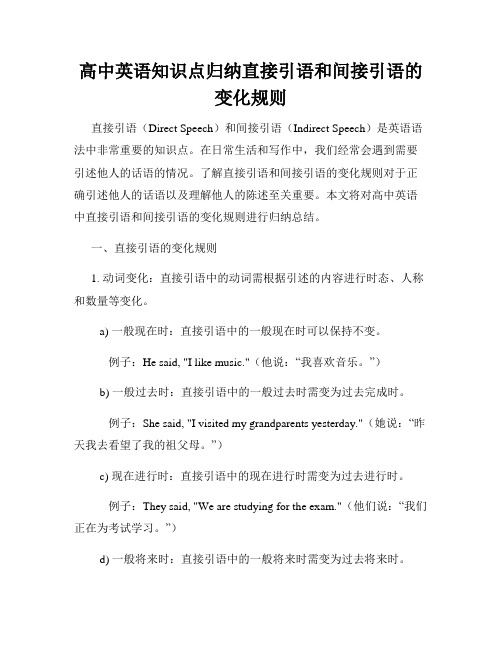
高中英语知识点归纳直接引语和间接引语的变化规则直接引语(Direct Speech)和间接引语(Indirect Speech)是英语语法中非常重要的知识点。
在日常生活和写作中,我们经常会遇到需要引述他人的话语的情况。
了解直接引语和间接引语的变化规则对于正确引述他人的话语以及理解他人的陈述至关重要。
本文将对高中英语中直接引语和间接引语的变化规则进行归纳总结。
一、直接引语的变化规则1. 动词变化:直接引语中的动词需根据引述的内容进行时态、人称和数量等变化。
a) 一般现在时:直接引语中的一般现在时可以保持不变。
例子:He said, "I like music."(他说:“我喜欢音乐。
”)b) 一般过去时:直接引语中的一般过去时需变为过去完成时。
例子:She said, "I visited my grandparents yesterday."(她说:“昨天我去看望了我的祖父母。
”)c) 现在进行时:直接引语中的现在进行时需变为过去进行时。
例子:They said, "We are studying for the exam."(他们说:“我们正在为考试学习。
”)d) 一般将来时:直接引语中的一般将来时需变为过去将来时。
例子:He said, "I will go to the cinema tomorrow."(他说:“明天我将去电影院。
”)2. 代词变化:直接引语中的人称代词(例如I、you、he、she、they 等)需按照引述者的身份进行变化。
例子:He said, "I am going to the park."(他说:“我要去公园。
”)3. 时间和地点变化:直接引语中的时间和地点词语需根据实际情境进行变化。
例子:She said, "I will meet you at the library tomorrow."(她说:“明天我会在图书馆见你。
高一英语直接引语变间接引语终结篇

高一英语直接引语变间接引语终结篇一. 语法讲解直接引述别人的原话,叫直接引语,直接引语通常都用引号括起来。
用自己的话把别人的话陈述出来,叫间接引语。
总结:直接引语是陈述句,变为间接引语时用连词that引导宾语从句。
从句中的人称、时态、指示代词、时间状语和地点状语等相应变化。
总结:直接引语是一般疑问句,变为间接引语时,用连词if或whether连接。
直接引语是特殊疑问句,变为间接引语时,仍用原来的疑问词作连词来引导。
总结:直接引语是祈使句时,采用“动词+宾语+不定式”结构,即ask/tell/order sb. (not) to do sth.注意:直接引语如果是客观真理,变间接引语时,时态不变。
The teacher said,“The earth goes round the sun.”→The teacher said that the earth goes round the sun.二. 经典例题1.He asked ____ for the violin.A. did I pay how muchB. I paid how muchC. how much did I payD. how much I paid2. Someone is ringing the doorbell. Go and see _____.A.who is heB. who he isC. who is itD. who it is3. Can you tell me ____?A.how good is his spoken EnglishB. how well his spoken English isC. how well he speaks EnglishD. how good he can speak English4. He said that he had bought the jacket____.A. before three daysB. three days beforeC. three days agoD. last week5. Did you say_____?A. that what he said was trueB. that it was true that he saidC. what did he say was trueD. what he said it was true6. Please tell me ____ from.A. where do you comeB. where you comeC. where you will comeD. there you come7. Ask her ____ come with us.A if she will B. if or not she willC. that if she willD. whether will she8. The driver said that he ____ pick ____ a passenger at West Street.A will, up B. would, upC. will, outD. would, out9. He said he ___ in 1993.A .has born B. had been bornC. had bornD. was born10. John ___ me he was going to help me with my English.A. explainedB. spokeC. toldD. said11. He asked me ___I would go to Beijing by air the next day.A. that ifB. ifC. that whetherD. how12. —Joyce, please don’t open the window.—Pardon?—I ______ open the window.A. tell you don’tB. tell you not toC. told you didn’tD. told you not to13. He_____they didn’t start early they wouldn’t catch the first bus.A. said that ifB. asked ifC. asked whetherD. said that whether14. The teacher asked us ______ so much noise.A. don’t makeB. not makeC. not makingD. not to make15. The doctor asked me what _______ with me.A. is wrongB. wrong isC. was wrongD. wrong was【参考答案】1—5 DDCCA 6—10 BABDC 11—15 BDADC。
高一英语语法直接引语变成间接引语的句子结构的变化
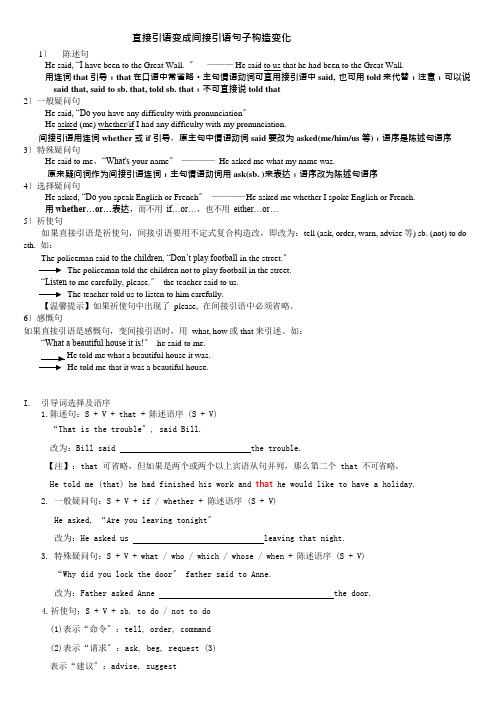
直接引语变成间接引语句子构造变化1〕陈述句He said, “I have been to the Great Wall. 〞———He said to us that he had been to the Great Wall.用连词that 引导,that 在口语中常省略。
主句谓语动词可直用接引语中said, 也可用told 来代替,注意,可以说said that, said to sb. that, told sb. that,不可直接说told that2〕一般疑问句He said, “Do you have any difficulty with pronunciation〞He asked (me) whether/if I had any difficulty with my pronunciation.间接引语用连词whether 或if 引导,原主句中谓语动词said 要改为asked(me/him/us 等),语序是陈述句语序3〕特殊疑问句He said to me,“What's your name〞————He asked me what my name was.原来疑问词作为间接引语连词,主句谓语动词用ask(sb. )来表达,语序改为陈述句语序4〕选择疑问句He asked, “Do you speak English or French〞————He asked me whether I spoke English or French.用whether…or…表达,而不用if…or…,也不用either…or…5〕祈使句如果直接引语是祈使句,间接引语要用不定式复合构造改,即改为:tell (ask, order, warn, advise 等) sb. (not) to do sth. 如:The policeman said to the children, “Don’t play football in the street.〞The policeman told the children not to play football in the street.“Listen to me carefully, please.〞the teacher said to us.The teacher told us to listen to him carefully.【温馨提示】如果祈使句中出现了please, 在间接引语中必须省略。
直接引语改为间接引语
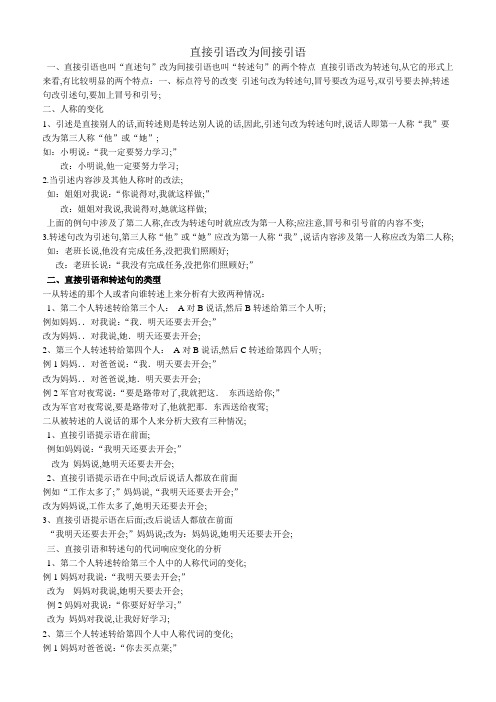
直接引语改为间接引语一、直接引语也叫“直述句”改为间接引语也叫“转述句”的两个特点直接引语改为转述句,从它的形式上来看,有比较明显的两个特点:一、标点符号的改变引述句改为转述句,冒号要改为逗号,双引号要去掉;转述句改引述句,要加上冒号和引号;二、人称的变化1、引述是直接别人的话,而转述则是转达别人说的话,因此,引述句改为转述句时,说话人即第一人称“我”要改为第三人称“他”或“她”;如:小明说:“我一定要努力学习;”改:小明说,他一定要努力学习;2.当引述内容涉及其他人称时的改法;如:姐姐对我说:“你说得对,我就这样做;”改:姐姐对我说,我说得对,她就这样做;上面的例句中涉及了第二人称,在改为转述句时就应改为第一人称;应注意,冒号和引号前的内容不变;3.转述句改为引述句,第三人称“他”或“她”应改为第一人称“我”,说话内容涉及第一人称应改为第二人称; 如:老班长说,他没有完成任务,没把我们照顾好;改:老班长说:“我没有完成任务,没把你们照顾好;”二、直接引语和转述句的类型一从转述的那个人或者向谁转述上来分析有大致两种情况:1、第二个人转述转给第三个人:A对B说话,然后B转述给第三个人听;例如妈妈..对我说:“我.明天还要去开会;”改为妈妈..对我说,她.明天还要去开会;2、第三个人转述转给第四个人:A对B说话,然后C转述给第四个人听;例1妈妈..对爸爸说:“我.明天要去开会;”改为妈妈..对爸爸说,她.明天要去开会;例2军官对夜莺说:“要是路带对了,我就把这.东西送给你;”改为军官对夜莺说,要是路带对了,他就把那.东西送给夜莺;二从被转述的人说话的那个人来分析大致有三种情况;1、直接引语提示语在前面;例如妈妈说:“我明天还要去开会;”改为妈妈说,她明天还要去开会;2、直接引语提示语在中间;改后说话人都放在前面例如“工作太多了;”妈妈说,“我明天还要去开会;”改为妈妈说,工作太多了,她明天还要去开会;3、直接引语提示语在后面;改后说话人都放在前面“我明天还要去开会;”妈妈说;改为:妈妈说,她明天还要去开会;三、直接引语和转述句的代词响应变化的分析1、第二个人转述转给第三个人中的人称代词的变化;例1妈妈对我说:“我明天要去开会;”改为妈妈对我说,她明天要去开会;例2妈妈对我说:“你要好好学习;”改为妈妈对我说,让我好好学习;2、第三个人转述转给第四个人中人称代词的变化;例1妈妈对爸爸说:“你去买点菜;”改为妈妈对爸爸说,让爸爸去买点菜;3、指示代词的变化这,那;例1叔叔在信里对我说:“有时间我一定到你.那儿玩;”改为叔叔在信里对我说,有时间他一定到我.这儿玩;例2他对我说:“这是我.的铅笔;”改为他对我说,那是他.的铅笔;4、没有代词的情况; 人们都说:“桂林山水甲天下;”改为人们都说,桂林山水甲天下;5、趋向动词的情况去,来妈妈对我说:“我来给你.烧饭;”改为妈妈对我说,她去给我.烧饭;归纳起来,转述句中的人称变换主要有以下几种形式:1、×××说:“我……;”如:鲁迅说:“我的信如果要发表,且有发表的地方,我可以同意;”这种类型的句子,在转述时,只要把句中的第一人称“我”改成第三人称“他”,去掉引号,冒号改成逗号即可;改成:鲁迅说,他的信如果要发表,且有发表的地方,他可以同意;2、×××对×××说:“我……,你……;”如:张明对王芳说:“我今天中午要到商店去买东西,回去可能要迟一点,请你告诉我妈妈;”这种类型的句子中出现了第一人称“我”,第二人称“你”等人称代词,分析句子,句中的“你”就是提示语冒号前面的语句的第二个人,即王芳;在转述中,把“我”改成“他”、“你”指王芳,可去掉,改成:张明对王芳说,他今天中午要到商店买东西,回去可能要迟一点,请告诉他妈妈;3、×××对×××说:“我……,你……,他……;”如:张老师对小明说:“我今天中午有事情,不能到公园去了,请你告诉张春,叫他不要等我了;”这样的句式中出现了“我”“你”“他”等人称代词,在转述中,如还是把“我”改成“他”,就和原句中的“他”混淆,产生误会,因而,原句中的“他”要改成张春引号中的那个人名;改为:张老师对小明说,他今天中午有事情,不能到公园去了,请告诉张春,叫张春下午不要等他了;亦可把语句稍作改动,改为:张老师对小明说,他今天中午有事情,不能到公园去了,请告诉张春,下午不要等他了;注意:句中的“他”一定是指说话的那个人;4、×××对×××说:“你的……,我……;”如:小明对小芳说:“你的书包非常漂亮,我非常喜欢;”由于句中“你”不是侧重描写的对象,它是用来限制书包是谁的;句中侧重描写的对象是物——书包,因而句中的你不能去掉,应改成提示语中的第二个人明即小芳;改为:小明对小芳说,小芳的书包非常漂亮,他非常喜欢;5、提示语在中间或在句末的句子,把提示语调整到句首可按以上方法进行改动;1妈妈对小花说:”今天我回家会晚一点.”妈妈告诉小花,她今天回家会晚一点2姐姐对明明说:”作业写完了吗”姐姐问明明,他作业写完没.3小红对妈妈说:"我要吃饭".小红对妈妈说她要吃饭4爸爸说:"你想去爬树吗我带你去"爸爸说我想去爬树他就带我去5渔夫问桑娜:”我不在,你在家里做些什么呢”渔夫问桑娜,他不在,她在家里做些什么呢6齐威王对田忌说:“怎么,难道你不服气”齐威王对田忌说,你不能不服气.7老师对小明说:“我看了你的作文很满意;”老师对小明说,看了他的作文很满意;8小军在中对我说:“下个月我一定到你那儿玩;”小军在中对我说,下个月他一定到我这玩;练习一、把下面句子改变人称换个说法;1、美丽的姑娘说:“我是智慧的女儿;”2、一位台湾同胞说,他是中国人,他爱中国;3、小明高兴地告诉妈妈,他在新华书店买了一本雷锋日记;二、把直接引述改为间接引述1、爸爸说:“小甜病了,我会不知道吗”2、王老师对同学们说:“如果明天下雨,我们就不去秋游了;”3、那位年轻的母亲说:“你这么大年纪了,我站一会儿就行了;”4、王军不好意思地说:“那次是我不好,不该弄坏你的钢笔;”三、把引述句转为陈述句;1、老师对我说:“我教你怎么写;”2、巴金说:“我爱月夜,但我也爱星天;”3、董存瑞坚决地说:“我去炸掉它”4、乌龟对青蛙:“你跳出井口来看一看吧;”5、鲁迅在回信中:“我的信如果要发表,且有发表的地方,我可以同意;”6、老师对我说:“你回去吧,我还要批改作业;”7、贝多芬问盲姑娘:“您爱听吗我再给您弹一首曲子吧;”8、萌萌把馍递给我:“老师,您几天都没吃饭了;您吃吧,吃了身体就有劲了;”9、那挑山工想了想说:“我们哪里有近道,还不和你们是一条道”10、列宁问:“我应该排在哪一位同志的后面”11、齐威王对田忌:“怎么,难道你还不服气”12、桑娜对丈夫说:“咱们的邻居西蒙死了;”13、海力布急得掉下眼泪说:“我可以发誓,我说的话千真万确;相信我的话吧,赶快搬走”四、按要求给下面句子改变人称换个说法;1、他热情地和我握了握手,说:“我的国语讲得不好,是初学的;”改为不用引号的转述2、蔺相如说:“秦王我都不怕,会怕谦将军吗”改为转述语句3、王老师对同学们说:“星期天,我们一起去滑雪”;改为间接引用4、小红军对陈庚说:“我还要等我的同伴呢”改为间接引用5、爸爸对妈妈说:“明天我出发,你别去上班了;”改为间接引用6、有一天,妈妈忽然对我说:“莺儿,我们回唐山去;”改为间接引用7、父亲说:“这是我对你们的希望;”改为间接引用8、他热情地和我握了握手,说:“我的国语讲得不好,是初学的;”改为不用引号的转述9、王老师对同学们说:“星期天,我们一起去滑雪”;改为间接引用五、照样子,改写下列句子;例:罗蒙摇摇头说:“爸爸,我也要一本书”罗蒙摇摇头对爸爸说,他也要一本书;1、雷锋说:“大嫂,我送你们一程吧”2、大嫂含着热泪激动地说:“同志呀,我一辈子也忘不了你的情意;”3、小鸟对青蛙说:“朋友,不信请你跳出井口看一看吧”六、把句子改成另一角度的说法;1、周总理笑呵呵地说,他做得对,应该按制度办事;2、小马嗒嗒嗒地跑过去,问牛伯伯,这条河,它能趟过去吗3、有人问王戎,他为什么不上树摘李子吃啊4、妈妈对我说:“明天我要出差,这几天只好你自己照顾自己了;”5.王宁说:“我要像李涌那样关心集体;”第三人称转述句专项练习2. 老师对我说:“我教你怎么写;”、3. 雨来摇摇头说:“我在屋里什么也没看见;”4. 李楠小声告诉我:“我家在少年宫附近;”5. 小姑娘说:“我要去北京,我要去看看北京的名胜古迹;”6. 老师对王芳说:“学校让你明天出席区小学生座谈会;”7. 罗蒙诺索夫摇摇头对爸爸说:“我也要一本书”8. 有一家外国报纸轻蔑地说:“能在南口以北修筑铁路的中国工程师还没有出世呢”9. 鲁迅先生对我说:“我卖给你,两本,一块钱;10. 他带着奖励似的微笑,指着铁流对我说道:“这书本来可以不要钱的,但是是曹先生的书,现在只收你一块钱本钱;我那一本,是送你的;”11、军官对夜莺说:“要是路带对了,我就把这.东西送给你;”12、张老师对小明说:“这件事情,你冤枉了小红;”13、妈妈对小宁说:“昨天,你到哪里去了我找了你一整天;”14、总理对我说:“我今晚上要批这些文件,你送来的稿子,我放在最后;你到隔壁值班室去睡一觉,到时候我叫你;”15、妈妈严肃地对我说:“马上就要期末考试了,你一定要认真复习,不要辜负老师和我对你的期望夸张句一、带有夸张的成语:一步登天垂涎三尺怒发冲冠火冒三丈寸步难行震耳欲聋弹丸之地度日如年惊天动地高耸入云气吞山河人山人海地动山摇十万火急一手遮天顶天立地一步登天一毛不拔垂涎三尺地动山摇胆大包天一日三秋一落千丈不毛之地千钧一发一字千金挥汗如雨举袖成云二、你能用夸张的手法来表达吗富得流油、气得火冒三丈、思念一日三秋、浪费一掷千金、穷得揭不开锅、危急千钧一发艰难水深火热、干净得一尘不染、高兴得一蹦三尺高、困难小得芝麻大、黑得伸手不见五指、容易得不费吹灰之力、力量大得九牛二虎之力、瘦得皮包骨头,芦苇杆、作业多得堆积如山天气冷得刺骨,滴水成冰、心眼小得针眼大,针尖大、少得如九牛一毛,沧海一粟、地方小得巴掌大,豆腐干大静得听到心跳,连针掉到地上都听到声音文章好得一字千金、声音大得地动山摇, 排山倒海,震耳欲聋, 惊天动地建筑高得高耸入云,直插云霄、时间短得一眨眼功夫,弹指之间大虫怒吼一声,就像晴天里起了个霹雳,震得山冈都动了.三、改写成夸张句:1、广场上人很多;2、他的歌声很响亮;3、会场上响起了热烈的掌声;4、这座楼真高;5、教室里真安静;6、学校的操场真小;7、他的心很痛;8、他的心眼儿很小;9、这个面包太小了;10、那个巷子里的酒真香;11、看到这个蛋糕,我太想吃了;12、我端起碗,觉得碗很重,怎么也送不到嘴边;13、他觉得时间过得太慢了14、他的成绩下降很多;15、时间过得真快,我们马上就要小学毕业了;16、他很饿;17、风太大了;18、他太重了;19、他家很穷;20、这个桔子很酸;21、他很口渴;22、这辆车开得太慢了;23、礼堂里十分拥挤;24、爸爸很生气;25、他一点胃口也没有26、李医生医术高明;27、寒风吹到脸上很痛;28、奶奶很节省;29、小明很瘦;。
直接引语变间接引语的讲解

Reported speech 间接引语.
“二随宾”是指直接引语变间接引 语时,若从句中的主语及宾语是第 二人称或被第二人你所修饰。从句 中的人称要跟引号外的主句的宾语 一致。如果引号外的主句没有宾语 。也可以用第一人称,如:
(be/can/may/must/will/should放主语后)
3.当直接引语是特殊疑问句时,用原来 的特殊疑问词引导(what / where等)
主语 asked+what 特殊疑问句(主谓)
where
4当直接引语是祈使句时用句型:
主语+ told
sb (not)to do sth
asked
2.一般疑问句直接引语变间接引语
Do you have math? ( They asked him )
you have math
They asked him Whether/if you have math.
he had
They asked him whether/if he had math.
My teacher said, “Tom is a good student. ” My teacher said Tom is a good student. 26
I can speak three languages.
What did he say?
He said he could speak three languages.
(2)如果在当地转述,here 不必改为there,动词come 不必改为 go.
(3)当转述客观真理时,直接引语变为间接引语时,时态不变。如: 1.He said , “The moon moves around the earth.
高中必修一直接引语变间接引语详解

直接引语变间接引语(宾语从句)一.直接引语和间接引语的定义。
直接引语:直接引用别人的话叫直接引语,间接引语:用自己的话转述别人的话叫间接引语。
直接引语前后加引号;间接引语不必加引号。
He said, “ I’m a student.” (直接引语)→ He said that he was a student. (间接引语)主句从句主句从句二.当直接引语为特殊疑问句变间接引语形成宾语从句时,首先要注意用特殊疑问词,其后用陈述语序的句子,同时注意人称、时态、时间状语,连接词,语序的变化.`(一)人称的变化规则:一随主,二随宾,第三人称不更新。
★(二).时态变化/宾语从句时态变化规则:主现从不限;主过从四过(即4种过去的时态:一般过去时;过去进行时;过去将来时;过去完成时);客观真理,只用一般现在时。
1.主句一般现在时,从句可用任意时态。
2.主句过去时,从句用相应的过去时态。
即一般现在时改成一般过去时;现在进行时改成过去进行时;一般将来时改成过去将来时;一般过去时、现在完成时、过去完成时改成过去完成时。
3.主句过去时,从句是客观真理时,只用一般现在时。
Teacher told us:" The moon moves round the earth."Teacher told us the moon moves round the earth.;《(三)★(四).连接词1.从句为陈述句,常选择连接词that或将that省略,直接与主句相连。
2.从句为一般疑问句,常选择连接词if或whether。
3.从句为特殊疑问句,常选择what,when,where,which,who,how等的疑问代、副词作连接词。
&注意:当who为主语时,句式为:who+谓语+其他:注意:1. 语序不变的有:What’ the matter with you What’s wrong with you但What’s the trouble with you的语序要变1)从句中有or / or not 。
高中英语直接引语变间接引语 PPT课件 图文

相应的变化
• 直接引语变间接引语时, 指示代词、时间状语 、地点状语等要作相应的变化。如:this/that→ these/those, now →then, today →that day, yesterday →the day before, last year →the year before, ago →before, here →there等。例如:
时态不变的情况
• 直接引语是客观事实、普遍真理等,变成 间接引语时,时态不变。例如:
• They told their son,"The earth goes round the sun."→
• They told their son that the earth goes round the sun.
•ould do it or not.
•
He hesitated about whether to drive or take
the train.
特殊疑问句
• 直接引语是特殊疑问句,变成间接引语 时,由相应的疑问词who, whom, whose, how, when, why, where 等引导。例如:
• The captain ordered, "Be quiet."→
• The captain ordered us to be quiet. • 注意:此种情况的否定句,在动词不
定式前加not。
• My teacher asked me, "Don't laugh."→
• My teacher asked me not to laugh.
•
He said, "I haven't seen her today."→
- 1、下载文档前请自行甄别文档内容的完整性,平台不提供额外的编辑、内容补充、找答案等附加服务。
- 2、"仅部分预览"的文档,不可在线预览部分如存在完整性等问题,可反馈申请退款(可完整预览的文档不适用该条件!)。
- 3、如文档侵犯您的权益,请联系客服反馈,我们会尽快为您处理(人工客服工作时间:9:00-18:30)。
直接引语变间接引语(宾语从句)
一.直接引语和间接引语的定义。
直接引语:直接引用别人的话叫直接引语,
间接引语:用自己的话转述别人的话叫间接引语。
直接引语前后加引号;间接引语不必加引号。
He said, “ I’m a student.” (直接引语)→ He said that he was a student. (间接引语)
主句从句主句从句
二.当直接引语为特殊疑问句变间接引语形成宾语从句时,首先要注意用特殊疑问词,.
其后用陈述语序的句子,同时注意人称、时态、时间状语,连接词,语序的变化.(一)人称的变化规则:一随主,二随宾,第三人称不更新。
★(二).时态变化
宾语从句时态变化规则:主现从不限;主过从四过(即4种过去的时态:一般过去时;过去进行时;过去将来时;过去完成时);客观真理,只用一般现在时。
1.主句一般现在时,从句可用任意时态。
"
2.主句过去时,从句用相应的过去时态。
即一般现在时改成一般过去时;现在进行时改成过去进行时;一般将来时改成过去将来时;一般过去时、现在完成时、过去完成时改成过去完成时。
3.主句过去时,从句是客观真理时,只用一般现在时。
Teacher told us:" The moon moves round the earth."
Teacher told us the moon moves round the earth.
、
! (三)
"
★(四).连接词
1.从句为陈述句,常选择连接词that或将that省略,直接与主句相连。
2.从句为一般疑问句,常选择连接词if或whether。
3.从句为特殊疑问句,常选择what,when,where,which,who,how等的疑问代、副词作连接词。
注意:当who为主语时,句式为:who+谓语+其他
注意:
1. 语序不变的有:What’ the matter with you What’s wrong with you
但What’s the trouble with you的语序要变
1)从句中有or / or not 。
例:she asks whether he stayed 。
2.只用whether 2)与不定式to do 连用。
例:I can’t decide whether to tell him the news
3) 在介词后。
例:they are talking about whether they can afford the new house
用法是有区别的,但当if/whether同时出现在选项中的时候,我们要选whether
★3.宾语从句语序:陈语述序,即:连接词+主语+谓语+其它。
或连接词(此时连接词充当主语)+谓语+其它。
陈述语序中:be动词、助动词、情态动词不能提到主语前。
例:1)can you tell me where is the hospital (错)
can you tell me where the hospital is.(对)
2)I don’t know whether does he speak Chinese (错)
I don’t know whether he speaks Chinese (对)
3)I am not sure what can he do (错)
I am not sure what he can do (对)。
